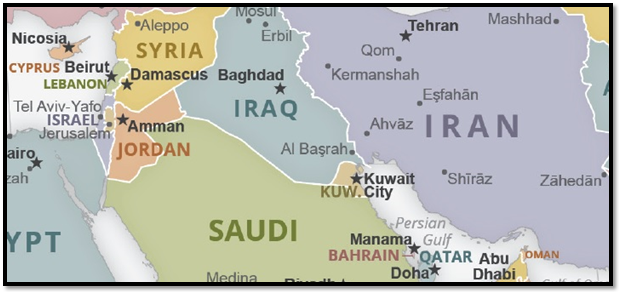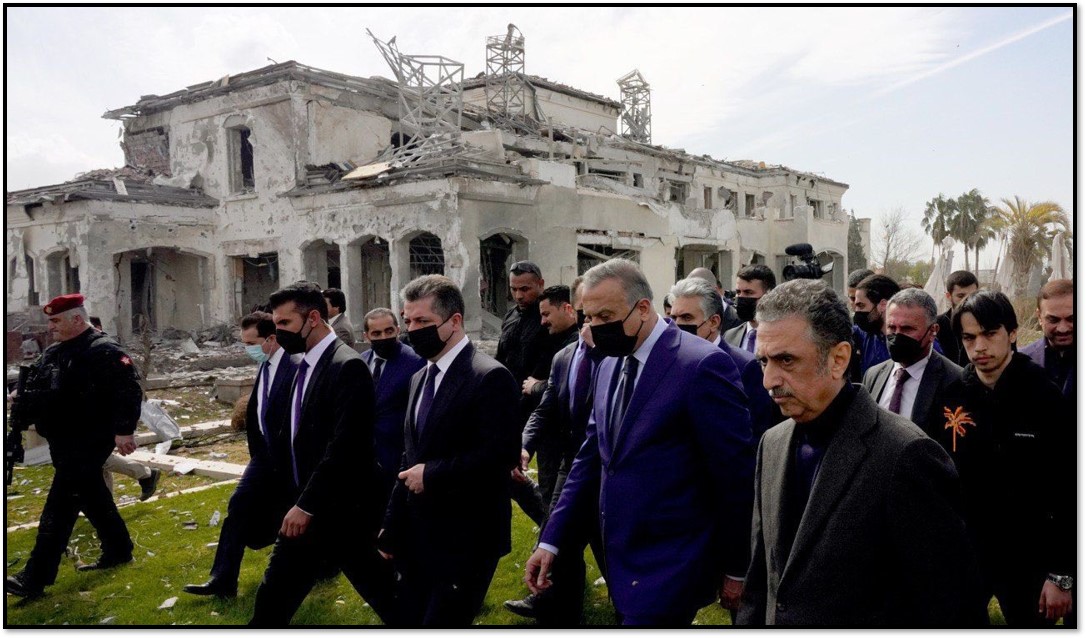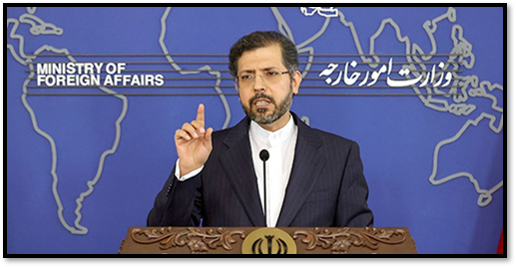Early on March 13, Iran launched a dozen ballistic missiles into neighboring Iraq. The Islamic Revolutionary Guard Corps (IRGC) claimed that it targeted Israeli “strategic centers” in the northern city of Erbil, the capital of the autonomous Kurdish region. Iraqi and U.S. officials said that the attack was unjustified.
 The missiles landed near a new U.S. consulate complex under construction, but the site was not damaged. “We do not believe that the consulate was actually the target of this missile attack,” Deputy Secretary of State Wendy Sherman said on March 13.
The missiles landed near a new U.S. consulate complex under construction, but the site was not damaged. “We do not believe that the consulate was actually the target of this missile attack,” Deputy Secretary of State Wendy Sherman said on March 13.
One civilian was injured, according to Kurdish authorities. At least four missiles hit a villa owned by Baz Karim Barzinji, the CEO and founder of oil company KAR Group. The offices of local television network K24 and some houses were also damaged.
Iraqi Response
Iraqi officials condemned the attack as a violation of their country’s sovereignty. But they stopped short of calling out Iran, the most influential foreign player in the country. Masrour Barzani, the prime minister of the Kurdistan Region, called the strike a “cowardly” act of terrorism. In a call with Secretary of State Antony Blinken, Barzani “stressed the urgent need to counter the fabricated set of false narratives used repeatedly in recent years in attacks on Erbil.”
Iraqi President Barham Salih suggested that the strike was aimed at obstructing the government formation process. Iraq held parliamentary elections in October 2021 but has yet to form a new government amid jockeying between rival political blocs. Iraq must “stand firmly against attempts to plunge the country into chaos,” Salih said. Prime Minister Mustafa al Kadhimi ordered the formation of a committee to investigate.

U.S. Reaction
The United States held Iran responsible. “Iran must immediately cease its attacks, respect Iraqi sovereignty, and halt its interference in Iraq’s internal affairs,” State Department Spokesperson Ned Price said.
In a statement, National Security Advisor Jake Sullivan pledged to support Iraq in “holding Iran accountable” and to help other U.S. partners to confront similar threats. “We are in consultation with the Iraqi government and the government in Iraqi Kurdistan, in part to help them get the missile defense capabilities to be able to defend themselves in their cities,” he told CBS News.
Iranian Claims
Iran characterized its behavior as defensive. “Several times in the past, Iraq’s territory was used against Iran by third parties including terrorist groups such as Kurdish militants, the United States and the Zionist entity (of Israel),” Foreign Ministry Spokesperson Saeed Khatibzadeh said on March 14. “The Islamic Republic of Iran expects Iraq’s central government that it will end this situation once and for all,” he added.

The IRGC said that the attack was retaliation for an alleged Israeli strike in Syria on March 7. Iran claimed that four people, including two IRGC colonels, were killed near Damascus. “Once again, we warn the criminal Zionist regime that the repetition of any mischief will face harsh, decisive and destructive responses,” the IRGC said.
Lebanese television station Al Mayadeen, which is associated with Hezbollah and Iran, cited another reason for the attack. Six Israeli drones – launched from Iraqi Kurdistan – reportedly destroyed hundreds of Iranian drones at a base in Kermanshah, in western Iran, in February.
The timing of the missile attack suggested that Iran also may have been seeking revenge for General Qassem Soleimani, who was assassinated in a U.S. drone strike near Baghdad airport in January 2020. Iran held Israel responsible for directing the attack. Israel reportedly contributed intelligence that was used to target Soleimani. Iran carried out the attack on Erbil at approximately 1 A.M. on March 13 – the same time that Soleimani was killed and soon after his birthday (March 11).
Iraqi and Turkish officials, speaking on condition of anonymity, later said that Iran was also expressing opposition to a plan to ship gas from Kurdistan to Turkey and Europe with Israeli involvement. A senior Iranian official told Reuters that the strike was a “multi-purposed message to many people and groups.” The official added that whatever Israel was planning “from energy sector to agriculture, will not materialize.” Baz Karim Barzinji, the owner of the villa that was hit, was involved in developing the gas pipeline, according to Iraqi and U.S. officials.
Iranian state media said that Fateh-110 missiles were used in the strike. The Fateh-110 has a range of up to 300 km (185 miles) and has been in service since 2004. Iran has the largest and most diverse ballistic missile arsenal in the Middle East.
Garrett Nada, managing editor of The Iran Primer, assembled this report.
